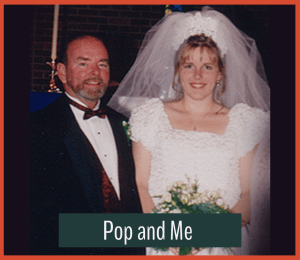By Beth Demme

As we approach Father’s Day this year I’m in the midst of an emotional quandary, pulled between grief and celebration.
It’s already been 16 months since my father passed away, but it seems like we were chatting and laughing together yesterday. His absence from my life is palpable and bottomless.
In these months, nearly a dozen of my friends have also lost their fathers. Some friends were close to their dads, others were geographically and emotionally distant. Regardless of the state of the relationship, it seems to sting.
In 1 Corinthians, Paul borrows from the Old Testament prophet Hosea: “Where, O death, is your victory? Where, O death is your sting?” (1 Cor. 15:55; Hos. 13:14)
Even though I believe death was not The End for my father, I have found death’s sting.
I wish Pop was here to celebrate Father’s Day.
If he were here, I would buy him a pair of argyle socks and some tool he doesn’t really need. I would play Scrabble and Dominoes with him. I would eavesdrop on his conversations with my children and marvel at their collective patience as they put together a puzzle.
But this year those things won’t happen.
I’m in a quandary because even as Father’s day reminds me of my loss, it’s also a time to celebrate my husband.
He is an amazing father, definitely worth celebrating. I want to thank him for his presence with, his attention to, and his love for our children. He’s intentional about teaching them to be respectful, to believe in themselves, and to never give up.
He’s the best parenting partner. I’m lucky and blessed and spoiled to have him.
I want to celebrate and honor him this Father’s Day!
And so, this one day on the calendar brings together a mess of emotions.
I bring all of this up because maybe you feel it too.
Maybe you have a husband worth celebrating, but you miss your own dad.
Maybe Father’s Day reminds of you of what you didn’t have growing up or what your children don’t have now.
Maybe you find this holiday bittersweet for reasons you can’t even articulate.
I just want you to know you aren’t alone. I’m here with you, celebrating and grieving at the same time.
I think God is here, too.
We sometimes have this idea that God is beyond emotion, but I don’t think that’s quite right.
In Genesis when humanity was basically a lost cause, the “Lord was grieved … and his heart was filled with pain.” (Genesis 6:6) The shortest verse in the entire Bible also captures this sentiment: “Jesus wept.” (John 11:35)
This verse is in the midst of a funeral scene. Just before Jesus raises his friend Lazarus from the dead he speaks with both of Lazarus’s sisters. After speaking with them, Jesus is “deeply moved in spirit and troubled.” (John 11:33)
Some people say Jesus wept because Lazarus’s sister, Mary, didn’t recognize him as the Messiah. While the other sister, Martha, says to Jesus “even now I know that God will give you whatever you ask,” Mary only laments his failure to arrive in time to save Lazarus. (John 11:22, 32)
Others teach Jesus wept because he felt empathy for his friends Mary and Martha. He wept because of their grief.
Still others teach Jesus wept because of his own grief. His human incarnation allowed him to directly experience the pain of grief when his friend died.
Whether one or all of these teachings is right, we are left with this: Jesus experienced sadness; tears fell from his eyes.
My pastor often shares this quote from French poet Paul Claudel: “Jesus did not come to explain suffering or to remove it. He came to fill it with his presence.”
This matches my own experience. In the depths of sadness, grief, pain, and disappointment, God has been there.
Even now, I take comfort because God is present with me in my quandary. He knows how sad I am about my Dad. He knows how happy I am about my husband. His presence makes the grief more bearable and the joy brighter.
What are you feeling this Father’s Day? Do you feel like celebrating? Do you feel numb? Do you feel resentful? Do you feel joyful? Tell me about it in the comments, on Facebook, Twitter, or via e-mail.
More like this:
